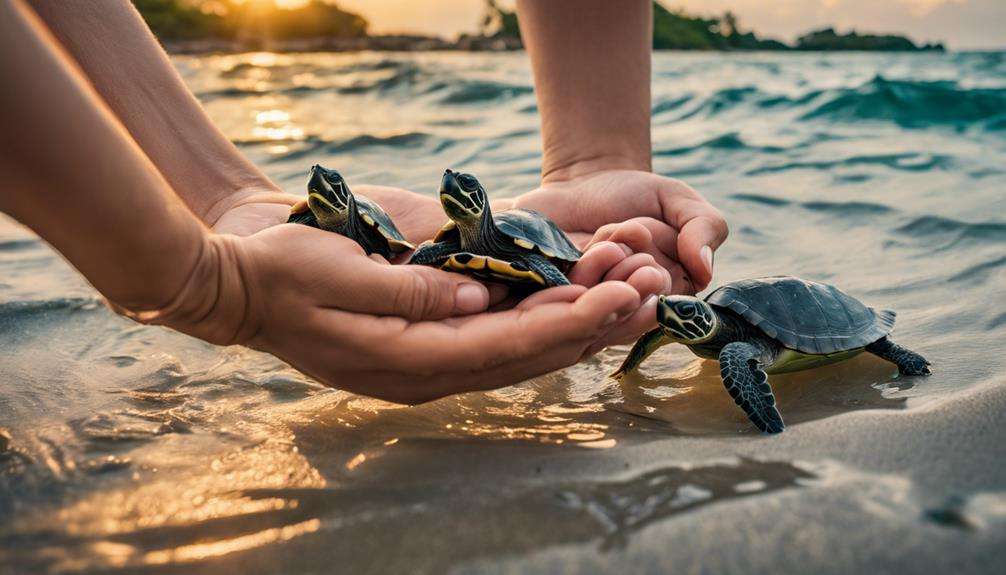To own rare turtles responsibly, you must navigate legal requirements with caution. Understanding the laws governing their ownership, making ethical sourcing, and obtaining necessary permits are essential steps.
However, there's one critical aspect often overlooked – the importance of liability and insurance when owning these unique creatures. How can you protect yourself and your turtles from unforeseen circumstances?
Let's explore this often underestimated legal tip for owning rare turtles to guarantee a well-rounded approach to their care and protection.
Key Takeaways
- Obtain necessary permits to legally own rare turtles and avoid legal consequences.
- Follow conservation regulations to protect endangered turtle species and their habitats.
- Secure liability insurance to mitigate risks associated with rare turtle ownership.
- Source rare turtles ethically and responsibly to support conservation efforts and ensure compliance with the law.
Legal Permits and Licenses
To legally own rare turtles in the United States, acquiring specific permits and licenses is imperative to comply with state and federal laws. Different states have varying regulations regarding ownership, making it vital to research and understand the specific requirements in your area. Obtaining a wildlife possession permit or a special use permit may be necessary for legally owning and caring for rare turtle species. Failure to secure the required permits can lead to legal consequences, including fines, confiscation of the turtles, or other penalties.
When looking to acquire rare turtles, working with reputable breeders or obtaining turtles from legal sources is essential to guarantee ethical practices and compliance with the law. It's advisable to seek guidance from a nonprofit organization specializing in turtle conservation to navigate the permit application process smoothly. By following the necessary steps and obtaining the required permits and licenses, you can enjoy owning rare turtles responsibly while contributing to their conservation in the United States.
Conservation Regulations
Conservation regulations play an essential role in safeguarding rare turtle species from various threats, such as habitat loss, pollution, and illegal trafficking. These regulations are vital for protecting endangered turtles that live near fragile ecosystems.
International agreements like CITES provide a framework for countries to cooperate in preserving these species. It's important to understand and comply with specific laws and regulations in your country regarding the ownership, trade, and conservation of rare turtles.
Conservation efforts may involve habitat restoration projects, captive breeding programs, and educational initiatives to raise awareness about the significance of protecting these vulnerable creatures. Violating conservation regulations can have severe consequences, including hefty fines, imprisonment, and damage to delicate ecosystems.
Liability and Insurance

Considering the unique risks associated with owning rare turtles, securing liability insurance is a crucial step to protect against potential legal claims or damages. In the unfortunate event that your rare turtles die, liability insurance can provide coverage for incidents such as property damage or injuries caused by your exotic pet.
It's important to carefully review your insurance policy as some providers may exclude coverage for exotic pets like rare turtles, leaving you vulnerable to significant financial risks. Owners of rare turtles may face higher insurance premiums due to the specialized care and potential liabilities associated with these pets.
Engaging in discussions with your insurance provider about your rare turtle ownership can help guarantee that you have the appropriate coverage in place for any unforeseen circumstances. By proactively addressing liability and insurance concerns, you can safeguard yourself against potential legal challenges and financial burdens arising from owning rare turtles.
Frequently Asked Questions
Why Are Tiny Turtles Illegal to Own as Pets?
Tiny turtles are illegal due to health risks like salmonella. Legal restrictions prevent their sale to safeguard public health. Wildlife conservation and pet trade laws regulate exotic pets, aiming to prevent disease outbreaks and protect both animals and humans.
Is It Ethical to Own a Turtle?
Owning a turtle ethically involves considering its welfare and complying with wildlife protection laws. Supporting conservation efforts and educating yourself about the species are essential. Your actions can impact ethical considerations and contribute to conservation efforts.
What Turtles Should You Not Pick Up?
When it comes to turtle conservation and wildlife protection, avoid picking up endangered, snapping, wild, softshell, and painted turtles. Follow rules to guarantee their well-being, as mishandling can harm these creatures and disrupt their natural habitats.
What to Do Before Buying a Turtle?
Before buying a turtle, research local regulations, guarantee proper licensing, and consider adoption to support ethical practices. Carefully vet sources to avoid illegal trade. Consulting with a vet will help you provide responsible care.
Conclusion
In summary, owning rare turtles comes with legal responsibilities that must be carefully followed. By obtaining the necessary permits and licenses, adhering to conservation regulations, and considering liability and insurance, you can guarantee the well-being of these unique creatures.
Remember, maneuvering the legal landscape of rare turtle ownership is like carefully treading through a delicate ecosystem, protecting and preserving these magnificent animals for future generations.






